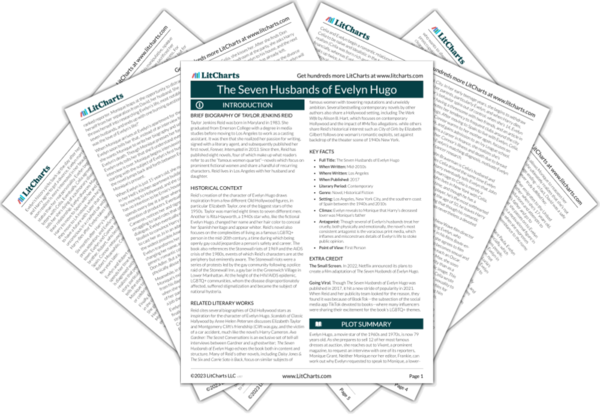The Seven Husbands of Evelyn Hugo illustrates that a strong family bond does not come from marriage or blood relation, but from the depth of connection two or more people share. Though Evelyn is raised by Evelyn’s father, she realizes as a young adult that she needs to put as much distance as possible between herself and him if she wants to succeed in life, suggesting that, despite his blood relation to her, Evelyn’s father is not a vital part of her family. However, Evelyn’s connection with Harry, a Hollywood producer with no blood relation to her, is built on a foundation of honesty and trust, and Evelyn understands that when she’s with him, she feels as if she’s with family. Evelyn’s family structure becomes further complicated when it involves four people—Celia, John, Harry, and herself (the four characters act as a pair of straight couples in public but are involved in gay relationships with each other in private). Things become even more complicated when Evelyn’s daughter, Connor, comes along. Despite these complications, the love the characters share for one another creates a familial bond unlike the one Evelyn had with her father. When all of these people have died, the loss crushes Evelyn: this found family meant more to her than any wealth or admiration she acquired throughout her life. With this illustration of a radically non-traditional family unit, in which each member commits to protecting the others from media attention and out of which arises many celebrations and acts of care, the book suggests that kindness, love, and self-sacrifice are more important elements of a family than any amount of shared DNA.
Family ThemeTracker

Family Quotes in The Seven Husbands of Evelyn Hugo
And then, of course, there was the three-page questionnaire I had to fill out about my life until then. What did my father do for a living? What did I like to do in my spare time? Did I have any pets?
When I turned in my honest answers, the researcher read it in one sitting and said, “Oh, no, no, no. This won’t do at all. From now on, your mother died in an accident, leaving your father to raise you. He worked as a builder in Manhattan, and on weekends during the summer, he’d take you to Coney Island. If anyone asks, you love tennis and swimming and you have a Saint Bernard named Roger.”

Unlock explanations and citation info for this and every other The Seven Husbands of Evelyn Hugo quote.
Plus so much more...
Get LitCharts A+Rex put out his hand, and I shook it.
“Well, I should be going,” he said, checking his watch. “I have a date with a particularly eager young lady, and I’d hate to keep her waiting.” He buttoned his coat as I stood up. “When should we tie the knot?” he asked.
Harry laughed and put out his hand. I shook it. “Once again, Evelyn, you’ve got yourself a deal.”
With her blond hair and her face thinning out, I was starting to fear that she looked more like me than Harry. Sure, conventionally speaking, she would be more attractive if she looked like me. But she should look like Harry. The world should give us that.
Robert always claimed that he married me because he would do anything for Celia. But I think he did it, in at least some small part, because it gave him a chance to have a family. He was never going to settle down with one woman. And Spanish women proved to be just as enchanted by him as American ones had been. But this system, this family, was one he could be a part of, and I think he knew that when he signed up.
No one is all good or all bad. I know this, of course. I had to learn it at a young age. But sometimes it’s easy to forget just how true it is. That it applies to everyone.
Until you’re sitting in front of the woman who put your father’s dead body in the driver’s seat of a car to save the reputation of her best friend—and you realize she held on to a letter for almost three decades because she wanted to know how much you were loved.
“It was almost as if when I met him, I met this other side of myself. Someone who understood me and made me feel safe. It wasn’t passionate, really. It was never about ripping each other’s clothes off. We just knew we could be happy together. We knew we could raise a child.”
Maybe I’ll leave that part out completely. I think I’d be willing to lie about Evelyn’s life to protect my mother. I think I’d be willing to omit the truth from public knowledge in the interest of the happiness and sanity of a person I love dearly.
I said, “Doesn’t it bother you? That your husbands have become such a headline story, so often mentioned, that they have nearly eclipsed your work and yourself? That all anyone talks about when they talk about you are the seven husbands of Evelyn Hugo?”
And her answer was quintessential Evelyn.
“No,” she told me. “Because they are just husbands. I am Evelyn Hugo. And anyway, I think once people know the truth, they will be much more interested in my wife.”











